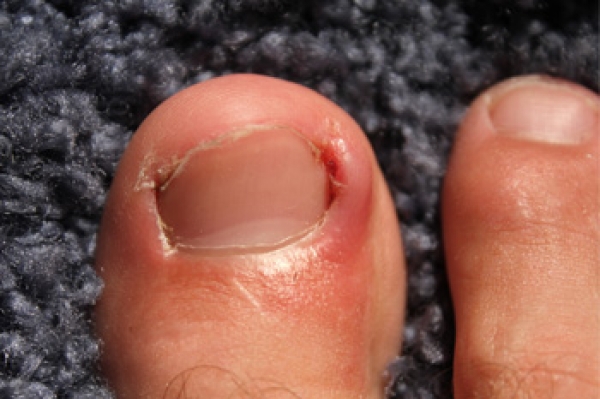 The condition that is known as an ingrown toenail typically affects the big toe. It occurs as a result of the outer edges of the toenail growing into the skin. Patients who are afflicted with this ailment are often familiar with the pain and discomfort an ingrown toenail may cause. If the toenail is infected, there can be drainage oozing from the surrounding area. General reasons why ingrown toenails may develop can include trimming the nails incorrectly, or wearing shoes that do not have ample room for the toes to move freely in. Participating in certain sporting activities where trauma is placed on the toe may contribute to the formation of an ingrown toenail. If you have this condition, it is suggested that you consult with a podiatrist as quickly as possible who can guide you toward proper treatment techniques.
The condition that is known as an ingrown toenail typically affects the big toe. It occurs as a result of the outer edges of the toenail growing into the skin. Patients who are afflicted with this ailment are often familiar with the pain and discomfort an ingrown toenail may cause. If the toenail is infected, there can be drainage oozing from the surrounding area. General reasons why ingrown toenails may develop can include trimming the nails incorrectly, or wearing shoes that do not have ample room for the toes to move freely in. Participating in certain sporting activities where trauma is placed on the toe may contribute to the formation of an ingrown toenail. If you have this condition, it is suggested that you consult with a podiatrist as quickly as possible who can guide you toward proper treatment techniques.
Ingrown toenails can become painful if they are not treated properly. For more information about ingrown toenails, contact Dr. Joshua David Scoll of Pennsylvania. Our doctor can provide the care you need to keep you pain-free and on your feet.
Ingrown Toenails
Ingrown toenails occur when a toenail grows sideways into the bed of the nail, causing pain, swelling, and possibly infection.
Causes
- Bacterial infections
- Improper nail cutting such as cutting it too short or not straight across
- Trauma to the toe, such as stubbing, which causes the nail to grow back irregularly
- Ill-fitting shoes that bunch the toes too close together
- Genetic predisposition
Prevention
Because ingrown toenails are not something found outside of shoe-wearing cultures, going barefoot as often as possible will decrease the likeliness of developing ingrown toenails. Wearing proper fitting shoes and using proper cutting techniques will also help decrease your risk of developing ingrown toenails.
Treatment
Ingrown toenails are a very treatable foot condition. In minor cases, soaking the affected area in salt or antibacterial soaps will not only help with the ingrown nail itself, but also help prevent any infections from occurring. In more severe cases, surgery is an option. In either case, speaking to your podiatrist about this condition will help you get a better understanding of specific treatment options that are right for you.
If you have any questions please feel free to contact one of our offices located in Philadelphia, Bensalem, and Fairless Hills, PA . We offer the newest diagnostic and treatment technologies for all your foot and ankle needs.

